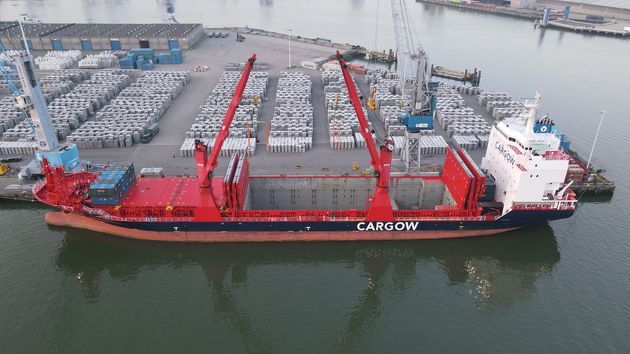During 2024 on the site of C. Steinweg – Handelsveem B.V. (Steinweg) Beatrixhaven terminal in Eemhaven area near Rotterdam, a pilot project with a mobile facility for shore-based power utilizing lithium-based batteries for CargoW’s MPP (Multipurpose) vessels arriving twice a week.
The objective of the pilot was to intensify the use of shore-based power in the port and is part of a partnership between the Municipality of Rotterdam and the Port of Rotterdam Authority.
The collaboration between the Municipality of Rotterdam and the Port of Rotterdam Authority began in December 2019, when a pilot was launched at Parkkade, Rotterdam, for supplying small sea-going vessels with electricity from the quay, or ‘shore-based power’ as it is called. Thanks to this method, the crew will no longer need to run the onboard diesel generators, resulting in reduced air pollution and noise.
Mobile shore-based power
During the pilot, several marketable concepts were put through real-world tests over a five-month period. Power consumption data was collected, and emissions and sound levels were measured. The pilot showed it is technically feasible to supply sea-going vessels with shore-based power using mobile concepts. The findings are being used to develop a permanent connection at Lloydkade as well as one at Parkkade later on. These findings were also a reason for the trialing of mobile shore power at the Steinweg location Beatrixhaven to start soon..
Cargow / Steinweg pilot
In most original terminal designs, the integration of any existing or future shore-based power has not been taken into account. Cranes, crane tracks and bollards nearby often impede the installation of equipment and cabinets for shore-based power and make connecting the cables between vessels and terminals a complex matter. To identify and remove such obstacles, the shore-based power project team of the municipality and PoR requested to set up a pilot at Steinweg as a follow-up to the Parkkade pilot. An autonomous, mobile installation utilizing lithium batteries was tested within the framework of the energy transition.
Mobile solutions are required at seaport terminals where investments in shore-based power are not required on a day to day basis. Likewise, tests were also performed on a cable management system to assess ease of deployment and flexibility.
Steinweg provided the required space at the terminal for the pilot to proceed smoothly. It will also apply for relevant permits and ensure a safe working area around the pilot project.
Cargow converted two of its vessels to run on shore-based power in operational conditions.
Shore-based power in Rotterdam
For over a decade, inland shipping has been using shore-based power in Rotterdam on a large scale. Shore-based power for sea-going shipping is complex, as electricity consumption is high and these vessels call at many different ports. Besides, many sea-going vessels do not have the proper connections for shore-based power. As part of the shore-based power programme, we are collaborating with other ports to bring about connection standards for smaller sea-going vessels.
Furthermore, the container ports of Rotterdam, Antwerp, Bremen, Hamburg and Haropa (including Le Havre) are coordinating their plans for shore-based power, which will lead to standardisation, lower costs and acceleration of the use of shore-based power. In the Port of Rotterdam, the Stena Line terminal in Hoek van Holland has shore-based power.
Potential of shore-based power for maritime shipping
Calculations by DNV GL and the Port Authority indicate that the total energy demand of sea-going vessels in the port amounts to around 750-850GWh. This is equivalent to the energy consumption of some 200,000 households. This means there is much to be gained in terms of air quality, liveability and the climate. Using a joint strategy, the Port of Rotterdam is preparing itself for the transition to cleaner shipping.
